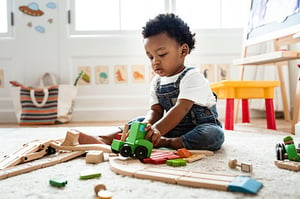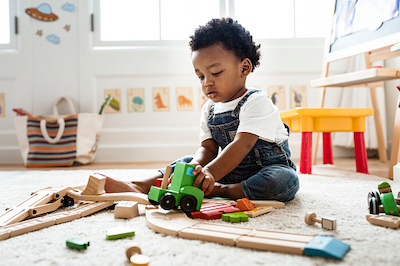 “With the help of a frilly dress, tiara and magic wand, your 3-year-old is transformed into the queen of a magical universe where her hobby horse is a winged unicorn. When you're asked to taste the pink clouds, you agree that they're a lot like bubblegum.” (KidsHealth.org)
“With the help of a frilly dress, tiara and magic wand, your 3-year-old is transformed into the queen of a magical universe where her hobby horse is a winged unicorn. When you're asked to taste the pink clouds, you agree that they're a lot like bubblegum.” (KidsHealth.org)
The preschool years have also been called the “magic years” of a child’s life. That’s because his or her brain has developed to the degree that amazing stories can be imagined during pretend play — but the child hasn’t yet reached the stage where he or she might wonder if such a story could really happen.
The imagination of preschool children can help them test out scenarios — what would it be like to be a lion? — while also helping them learn problem-solving techniques. This type of play helps kids discover how to handle intense emotions, as well, and more.
Here are some ways to encourage imaginative play:
- Join in the pretend play. If your preschooler roars like a lion and announces that he’s reached the top of the highest mountain in the world, ask what the world looks like from there. Ask how hard it was to climb that high. Ask what it feels like to be able to roar.
- Limit the use of electronic devices and provide your preschool children with blocks, clay, dolls and more. These toys require — and help to further develop — imagination.
- Read books to your child and ask him or her what might happen next in the story, how a character might feel, and so forth.
When your preschooler engages in imaginative play, it’s a natural stage in child development. School-age children, in contrast, have a better understanding of what’s possible and what’s not. By about age 6, a child enters what’s called the age of reason. This happens because an area of the brain called the prefrontal cortex has developed enough to allow school-age children to reason at a higher level.
Types of Play
Pediatrics, the official journal of the American Academy of Pediatrics (AAP), provides an in-depth look at playing, noting how free play is a “healthy essential part of childhood.” While parental supervision during free play makes sense for safety purposes, the child should largely take the lead.
Solitary play, also called independent play, helps young children learn how to entertain themselves. During preschool years, it can involve putting Legos together, assembling a puzzle, coloring, playing with blocks, flipping through books, and so forth.
Parallel play is a natural next step in child development. This is when, around the age of 2.5 and to 3 years of age, young children play next to one another without actually engaging in play with someone else. This shouldn’t take the place of solitary play because it’s important for children to continue to have alone time.
Parallel play leads to the next stage of child development, which is cooperative play, or when young children play well with others. Cooperative play helps children develop their problem-solving and social skills.
Although there can be value in screen time, the AAP recommends continuing emphasis on what they call “true toys, such as blocks and dolls.” This type of play helps kids “use their imagination fully, over passive toys that require limited imagination.”
The AAP recommends that, for children aged 2 to 5, screen time should be limited to an hour per day. During that digital time, they suggest quality shows like Sesame Street or connecting with grandparents through Skype.
Finally, they recommend that parents choose child care centers and early education programs that also focus on helping children develop social skills and meeting emotional development needs. Here’s more information about the preschool and pre-k programs offered at Horizon Education Centers, where we provide individualized learning opportunities to prepare children socially and academically for kindergarten.




